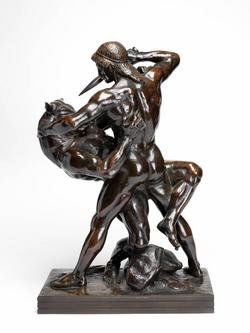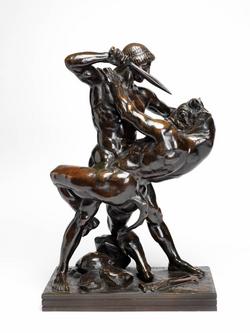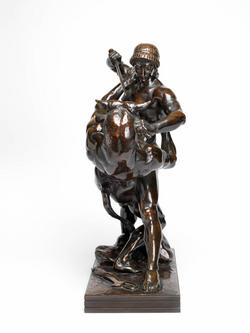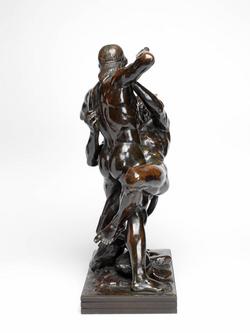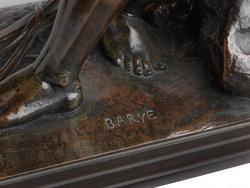Current Location: In storage
Titles
Thésée combattant le Minotaure, seconde version
Translated as: Theseus and the Minotaur, second version
(Theseus and the Minotaur, second version)
Maker(s)
Sculptor:
Barye, Antoine Louis
Entities
Categories
Description
Bronze figure group of Theseus about to kill the Minotaur
Notes
History note: Sotheby's 13 July 1960, lot 133, purchased by L. Spero from whom purchased in 1960.
Legal notes
Sir Ivor and Lady Batchelor Bequest through The Art Fund
Acquisition and important dates
Method of acquisition: Bequeathed
(2015-04-27)
by
Batchelor, Ivor, Sir and Lady
Dating
19th Century
Production date:
after
AD 1857
: Original model (first version): 1843; original model (second version): by 1857. First cast in bronze: 1857; this edition cast at an unknown date after 1857.
Note
Dubbed the ‘Michelangelo of the Menagerie’ by art critic Théophile Gautier (1811–72), Barye was a Romantic realist artist based in Paris who popularised the genre of animal sculpture from the 1830s onwards. Animals were very low down in the traditional Academic hierarchy of accepted subject-matter for artists, and the term animalier (an artist specialising in animals) was coined by critics specifically for Barye as a pejorative appellation. Barye was a successful monumental sculptor, but also created hundreds of small-scale models of animals for reproduction in bronze editions for middle-class homes. His last sales catalogue of 1865 listed over 230 compositions available to order as edition bronze statuettes. Keen for accuracy, Barye studied ancient animal sculptures as well as live beasts in the Musée d’Histoire Naturelle’s menagerie, copied zoological specimens in the Musée d’Anatomie Comparée and made anatomical drawings of dead lions. Bayre’s animal portraits include single animal figures (e.g. M.19-2015) and groups of predators with prey, or in combat with each other (e.g. M.1-2015), and some with human figures, such as the present group.
According to ancient Greek mythology, King Minos of Crete decreed that seven Anthenian young men and women be sacrificed each year to the Minotaur, a half-man, bull-headed monster, imprisoned in a labyrinth. Theseus, son of the King of Attica, heroically fought and killed the Minotaur at the heart of the labyrinth, using a sword that Minos’ daughter, Ariadne had given him. Theseus and the Minotaur is considered to be one of Barye's most striking neoclassical works. The stylised figure of Theseus is inspired by two drawings: one of an executioner by Henry Fuseli (1741–1825), in turn derived from the executioner in the Renaissance fresco of The Beheading of John the Baptist by Andrea del Sarto in the Scalzi Monastery, Florence; the second a sheet of sketches of boxers by Théodore Géricault (1791–1824). Barye submitted the original model of this group to the Paris Salon of 1843 together with four other works, all of which were rejected. It was later listed in the catalogue of Besse et Cie (a leading Paris firm of art dealers) in 1844, where it was described as ‘one of the most beautiful works, one of the most energetic figures that modern sculpture has produced’. Barye later revised the base of this first version, resulting in the second version seen here. The first bronze cast of the first model was exhibited in the 1855 Exposition Universelle in Paris (now Victoria and Albert Museum, London, no. 2708-1856). The second version was probably modelled after this date and was first cast in bronze in 1857. At the posthumous sale of Barye's studio contents in 1876, the Theseus model was highly sought after. It was bought by the art dealers Goupil et Cie to be replicated in bronze editions by the Paris-based foundry, F. Barbedienne. It is unclear whether the present bronze was cast during Barye's lifetime, or is a posthumous edition.
School or Style
French
Components of the work
Base
Height 3.3 cm
Length 16.1 cm
Width 26.9 cm
Figure
Height 45.1 cm
Length 30.5 cm
Width 18.7 cm
Materials used in production
Copper alloy
Bronze
Techniques used in production
Casting (process)
: Cast, bronze, patinated
Patination
Inscription or legends present
- Text: 'BARYE' in intaglio
- Location: Top rear of base
- Type: Mark
References and bibliographic entries
Related exhibitions
Identification numbers
Accession number: M.5-2015
Primary reference Number: 201415
Old object number: 1
Former loan number: AAL.239-2006
Stable URI
Audit data
Created: Thursday 28 May 2015
Updated: Monday 16 December 2019
Last processed: Tuesday 29 July 2025
Associated departments & institutions
Owner or interested party:
The Fitzwilliam Museum
Associated department:
Applied Arts
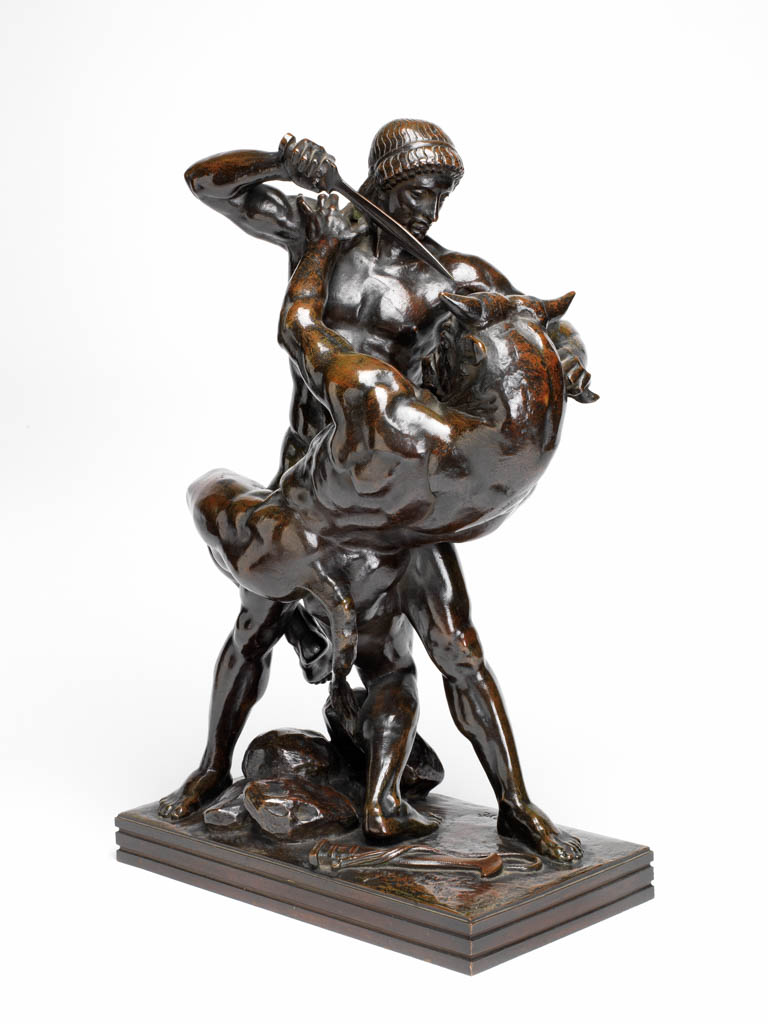
 IIIF Manifest
IIIF Manifest
